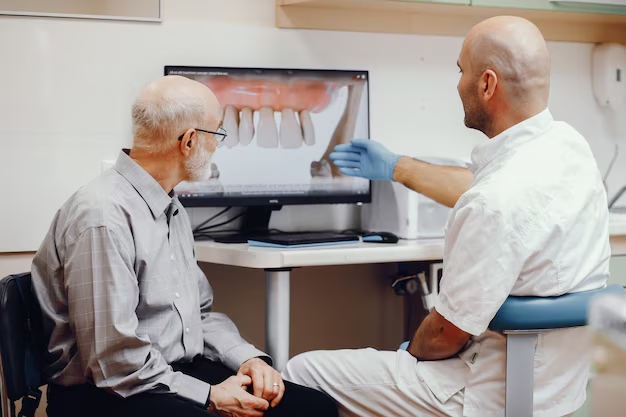Your Guide to Does Medicare Pay For Tooth Extractions
What You Get:
Free Guide
Free, helpful information about Medicare FAQ and related Does Medicare Pay For Tooth Extractions topics.
Helpful Information
Get clear and easy-to-understand details about Does Medicare Pay For Tooth Extractions topics and resources.
Personalized Offers
Answer a few optional questions to receive offers or information related to Medicare FAQ. The survey is optional and not required to access your free guide.
Understanding Medicare Coverage for Tooth Extractions: What You Need to Know
Navigating the complexities of Medicare can be a daunting task, especially when it comes to understanding what is and isn’t covered under its various plans. A common question that arises is whether Medicare pays for tooth extractions. Dental health is crucial, and sometimes, tooth extraction becomes inevitable. Let's dive into the specifics to provide a clear answer.
Medicare's Stand on Dental Services
Unfortunately, traditional Medicare (Part A and Part B) does not typically cover routine dental care, including most tooth extractions. This means that regular cleanings, fillings, crowns, and bridges are also generally excluded. Medicare's primary focus is on medically necessary services, and dental care is not categorized as such under its standard guidelines.
Exceptions to the Rule
There are scenarios where Medicare Part A may cover dental services if they are considered necessary for another covered procedure. For example, if you require tooth extraction before receiving treatment for oral cancer, Medicare might cover it as part of your hospital inpatient care. Similarly, emergency or complex dental procedures done in a hospital setting could also qualify for coverage.
Considering Medicare Advantage Plans
For those looking for broader dental coverage, Medicare Advantage Plans (Part C) can be an option. These plans are offered by private companies approved by Medicare and can include additional benefits for dental care, often covering routine services to some extent. It’s crucial to compare plans comprehensively as coverage can vary significantly between them.
Exploring Financial Assistance and Other Resources
Despite the lack of coverage from standard Medicare, several financial assistance programs and resources are available to help manage dental expenses:
Medicaid: Depending on your state, Medicaid may offer some level of dental coverage. Eligibility and benefits differ, so it’s best to check with your state’s program.
Community Health Clinics: These clinics often provide dental care on a sliding fee scale based on income, making it more affordable for those without insurance coverage.
Nonprofit Organizations: Some nonprofits offer programs to help cover the cost of dental services, including extractions. A bit of research can uncover these options in your area.
Dental Schools: Many dental schools provide reduced-cost services performed by students under professional supervision. This can be a more affordable way to receive necessary care.
Broaching Financial Relief Beyond Medical Care
If dental expenses still pose a financial challenge, exploring broader financial assistance and educational resources is wise. Here are some options to consider:
Government Aid and Support Programs: Look into programs like SNAP, TANF, or others based on your situation. They may free up resources to allocate elsewhere.
Educational Grants: For those pursuing education, grants can help redirect funds to cover other expenses, including health care.
Credit Card Solutions: Consider using a credit card with favorable terms for medical expenses; just ensure you understand the interest terms to avoid additional financial strain.
Debt Relief Options: Explore strategies like debt consolidation or talking to a financial advisor to create a manageable plan tailored to your needs.
While Medicare’s restrictions on dental coverage present challenges, knowing what options are available can empower you to make informed decisions. Understanding your financial situation and exploring different resources will help you maintain your dental health without compromising financial stability.
Financial Assistance Programs and Resources:
- 💸 Medicaid: Potential dental coverage varies by state.
- 🏥 Community Health Clinics: Offers sliding scale fees for care.
- 🙏 Nonprofit Organizations: Some help cover dental service costs.
- 🎓 Dental Schools: Reduced-cost services under supervision.
- 📈 Credit Card Solutions: Use responsibly for medical expenses.
- 🔄 Debt Relief: Consolidation and advisory services for managing finances.
- 🎓 Educational Grants: Support that can free up personal funds.
What You Get:
Free Medicare FAQ Guide
Free, helpful information about Does Medicare Pay For Tooth Extractions and related resources.

Helpful Information
Get clear, easy-to-understand details about Does Medicare Pay For Tooth Extractions topics.

Optional Personalized Offers
Answer a few optional questions to see offers or information related to Medicare FAQ. Participation is not required to get your free guide.


Discover More
- a Medical Provider That Accepts Medicare Assignment Must
- a Medical Provider That Accepts Medicare Assignment Must Quizlet
- a Medicare Patient Received Treatment That Isn't Covered By Medicare
- a Medicare Patient Receives Treatment That Isn't Covered By Medicare
- a Medicare Supplement Basic Benefit Is Quizlet
- a Medicare Supplement Companies
- a Medicare Supplement Policy Is Quizlet
- a Medicare Supplement Policy Must Not Contain Benefits Which
- a Patient Received Treatment In August Medicare
- Am I Eligible For Medicare
